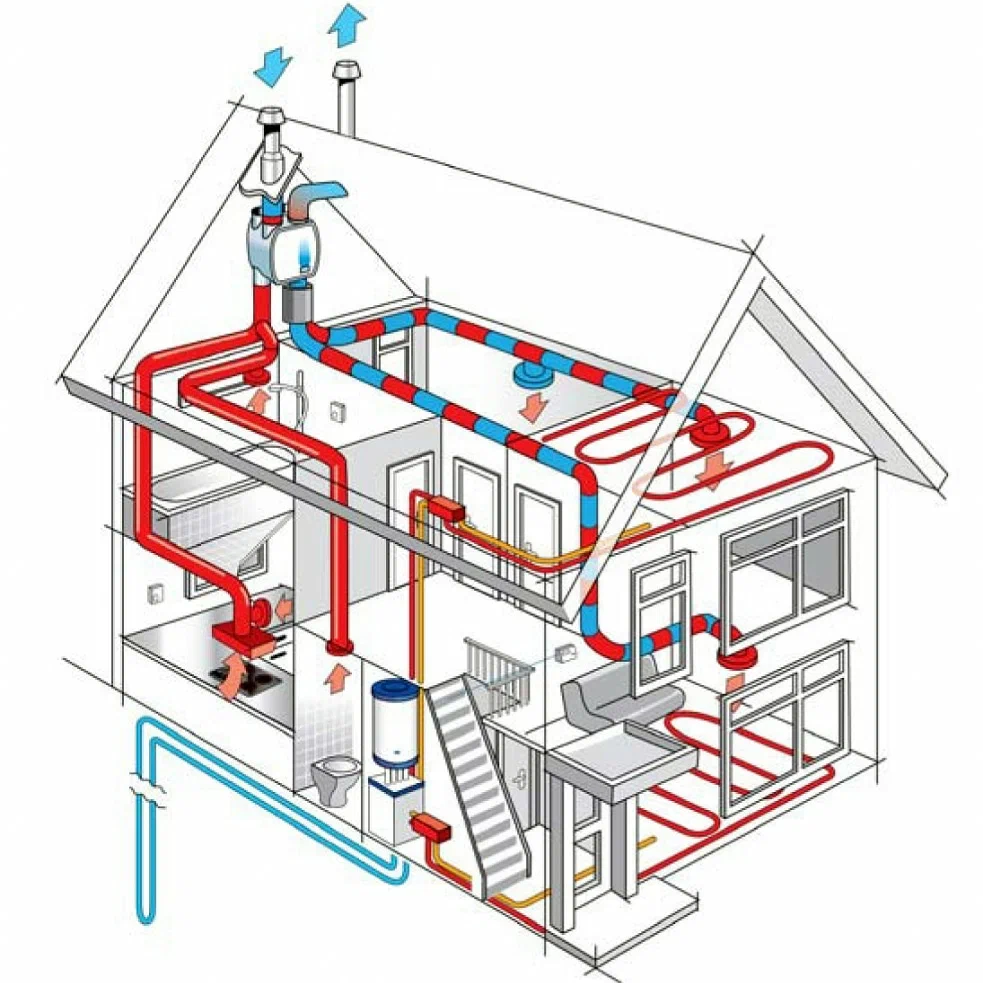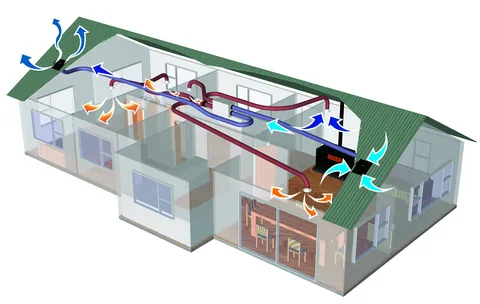A comfortable and healthy home is essential for every homeowner. It’s a place where we relax, spend time with loved ones, and create cherished memories. However, without proper ventilation, our homes can become stuffy, humid, and even hazardous to our health. That’s why house ventilation is the ultimate house companion. Not only does it improve air quality, but it also provides a range of benefits that make it a must-have for any modern household.
The Importance Of Ventilation Systems For Healthy Living
A healthy home is a happy home. And one of the key factors in creating a healthy living environment is proper ventilation. Ventilation systems play a crucial role in maintaining the air quality in our homes and ensuring that we breathe in clean, fresh air.
When our homes lack proper ventilation, pollutants such as dust, mold, and allergens can build up, leading to a range of health issues. These pollutants can irritate our respiratory systems, trigger allergies, and even worsen existing conditions such as asthma. Additionally, without proper ventilation, excess moisture can accumulate, creating the perfect breeding ground for mold and mildew, which can also pose health risks.
Ventilation systems not only help to remove these harmful pollutants from our homes but also provide a constant flow of fresh air, improving the overall air quality. By investing in a ventilation system, you can ensure that you and your loved ones can breathe easy and enjoy a healthier living environment. But the importance of ventilation systems for healthy living doesn’t stop there. These systems also play a vital role in controlling temperature and reducing humidity levels in our homes. They help to prevent the buildup of excess moisture, which can cause discomfort and contribute to the growth of mold and mildew.
Overall, a well-functioning ventilation system is essential for maintaining a healthy and comfortable home. By choosing to invest in a ventilation system, you are not only prioritizing your health but also creating a space where you can truly relax and enjoy the benefits of a well-ventilated living environment. So, don’t underestimate the power of proper ventilation – it’s a game-changer for healthy living.
 Essential Reasons To Opt For A Ventilation System In Your Home
Essential Reasons To Opt For A Ventilation System In Your Home
When it comes to choosing a ventilation system for your home, there are several essential reasons why it should be at the top of your priority list. Firstly, a ventilation system helps to remove pollutants and improve air quality. By constantly circulating fresh air, it reduces the risk of respiratory issues, allergies, and asthma attacks caused by dust, mold, and allergens. Secondly, a ventilation system plays a crucial role in controlling humidity levels. Excess moisture can lead to discomfort, mold growth, and even structural damage.
With a ventilation system in place, you can maintain optimal humidity levels, ensuring a healthier and more comfortable living environment. Thirdly, installing a ventilation system can greatly contribute to energy efficiency. By effectively managing airflow and temperature, it helps to regulate the indoor climate, reducing the need for excessive heating or cooling. This not only saves energy but also lowers utility bills, benefiting both the environment and your wallet.
Lastly, a ventilation system improves the overall comfort of your home. It keeps air circulating, preventing stuffiness and stale odors. Whether it’s during hot summers or cold winters, a well-ventilated home ensures that you and your loved ones can always enjoy a fresh and inviting living space.
The Role Of Ventilation Systems In Controlling Humidity Levels
One of the key roles that ventilation systems play in our homes is controlling humidity levels. Excess moisture in the air can lead to a range of issues, from discomfort to mold growth and even structural damage. This is where a well-designed and properly functioning ventilation system can truly make a difference.
By effectively circulating air throughout your home, a ventilation system helps to remove excess moisture and maintain optimal humidity levels. This not only creates a more comfortable living environment but also prevents the growth of mold and mildew, which can have detrimental effects on both your health and the integrity of your home.
In addition, controlling humidity levels can also contribute to energy efficiency. When the air in your home is too humid, it can feel warmer than it actually is, causing you to rely more heavily on your cooling system. With a ventilation system in place, you can regulate the moisture in the air, reducing the need for excessive cooling and ultimately saving on energy costs. Overall, a ventilation system is an essential tool for controlling humidity levels in your home, ensuring a healthier, more comfortable, and more energy-efficient living space.
Benefits Of Installing A House Ventilation For Energy Efficiency
When it comes to making your home more energy efficient, installing a ventilation system is a smart choice. Not only does it improve air quality and promote a healthier living environment, but it also helps to maximize energy efficiency. Here are some key benefits of installing house ventilation for energy efficiency. Firstly, a ventilation system helps to regulate temperature and airflow throughout your home. By effectively managing the air circulation, it can prevent hot and cold spots, ensuring a more balanced and comfortable indoor climate.
This means that you can rely less on heating and cooling systems, ultimately reducing energy consumption and saving on utility bills. Additionally, a well-designed ventilation system can also contribute to better insulation. By removing excess moisture and controlling humidity levels, it helps to prevent condensation and the potential for mold growth. This means that your home is better protected against structural damage, and you won’t need to spend extra money on repairs and maintenance.
Furthermore, a ventilation system can improve the overall energy efficiency of your home by reducing the strain on your HVAC system. When your ventilation system is working efficiently, it helps to evenly distribute heated or cooled air, minimizing the workload on your HVAC system and extending its lifespan.
Maximizing The Efficiency Of Your Ventilation System
When it comes to your ventilation system, you want to make sure you’re getting the most out of it. After all, it’s there to improve your home’s air quality and energy efficiency. Here are some tips for maximizing the efficiency of your ventilation system:
Regular Maintenance: Just like any other system in your home, your ventilation system needs regular maintenance to keep it running smoothly. This includes cleaning or replacing filters, checking for any blockages, and ensuring all components are in good working condition.
Proper Use: Make sure you’re using your ventilation system correctly. This means turning it on when needed and adjusting the settings based on your specific needs. Don’t forget to close windows and doors to prevent the system from working overtime.
Air Sealing: To ensure your ventilation system is operating at maximum efficiency, it’s important to properly seal any air leaks in your home. This can be done by adding weatherstripping to windows and doors, sealing gaps and cracks, and insulating your home properly.
Use Programmable Thermostats: A programmable thermostat can help you regulate the temperature in your home more efficiently. By setting it to lower or higher temperatures during times when you’re not at home or asleep, you can reduce the workload on your ventilation system and save energy.
Consider Upgrading: If your current ventilation system is outdated or not functioning optimally, it might be worth considering an upgrade. Newer systems are often more energy-efficient and can provide better air quality.
By following these tips, you can maximize the efficiency of your ventilation system and enjoy a healthier, more comfortable home while also saving on energy costs.
The Long-Term Savings Of Investing In A Ventilation System
Investing in a ventilation system for your home is not only beneficial for your health and comfort but can also lead to long-term savings. While the initial cost of installing a ventilation system may seem daunting, the potential savings in the long run make it a wise financial decision. Firstly, a well-functioning ventilation system helps to regulate the temperature in your home, reducing the need for excessive heating or cooling.
By effectively managing airflow and temperature, it ensures that your HVAC system doesn’t have to work as hard, leading to lower energy consumption and ultimately lower utility bills. Secondly, by controlling humidity levels, a ventilation system helps to prevent the growth of mold and mildew, which can lead to expensive repairs and maintenance. Mold remediation can be a costly process, and by investing in a ventilation system, you can avoid these potential expenses in the future.
Furthermore, a ventilation system can prolong the lifespan of your HVAC system. When your ventilation system is working efficiently, it helps to evenly distribute heated or cooled air throughout your home, reducing the strain on your HVAC system. This can result in fewer repairs and replacements, saving you money in the long term.
FAQs
What Is House Ventilation?
House ventilation is a mechanism that circulates air in and out of a space, ensuring proper air flow and improving indoor air quality. It helps remove pollutants, control humidity levels, and maintain a comfortable living environment.
Do I Really Need A Ventilation System If I Have Windows?
While windows can provide some ventilation, they may not be sufficient to remove indoor pollutants effectively or maintain consistent airflow. A ventilation system offers a more controlled and efficient solution to ensure clean and fresh air throughout your home.
How Do Ventilation Systems Improve Air Quality?
Ventilation systems remove harmful pollutants such as dust, mold, allergens, and volatile organic compounds (VOCs) from the air. They provide a constant flow of fresh air and filter out contaminants, improving the overall air quality in your home.
Can A Ventilation System Help Reduce Energy Costs?
Yes, a properly functioning ventilation system can contribute to energy efficiency. By managing airflow and temperature, it helps regulate the indoor climate, reducing the need for excessive heating or cooling. This, in turn, can lead to lower energy consumption and utility bills.
Conclusion
In a nutshell, a ventilation system is a crucial addition to any home. Not only does it improve air quality and promote a healthier living environment, but it also offers a range of benefits that make it a wise investment. From removing pollutants and controlling humidity levels to increasing energy efficiency and maximizing comfort, a ventilation system is a game-changer for healthy living. It ensures that you and your loved ones can breathe clean, fresh air, free from harmful contaminants. It also helps to prevent the growth of mold and mildew, reducing the risk of costly repairs and maintenance.



